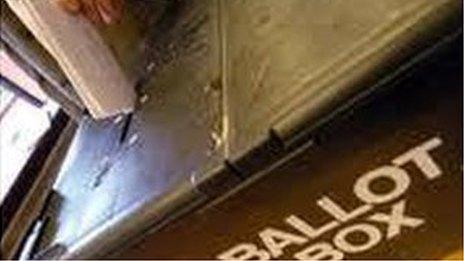Anonymous voter law 'stops women in safe houses voting'
- Published
Mehala Osborne has started a petition calling for it to be made easier for voters who need anonymity
Women placed in secret safe houses are unable to cast ballots in elections due to the restrictions on voter anonymity, campaigners have said.
People can request anonymity on the electoral register but the process has been dubbed "impossible" for many.
A petition to change the law, started by Bristol safe house resident Mehala Osborne, has gained more than 22,000 signatures.
The Electoral Commission said it would "develop options" to change the system.
Anonymous registration is available to people whose safety would be at risk if their name or address appeared on the electoral register, but it requires court documents signed by a "qualifying officer" such as a senior police officer or the head of the security service.

Who can sign off an attestation for an anonymous registration to vote?
A police officer of or above the rank of superintendent of any police force in the UK
The Director General of the Security Service or the Serious Organised Crime Agency
A director of adult social services or children's services in England or a director of social services in Wales
Any chief social work officer in Scotland
Any director of social services of a Health and Social Services Board or executive director of social work of a Health and Social Services Trust in Northern Ireland
Source: The Electoral Commission

Ms Osborne said: "If you're in a safe house you can't have an injunction in place because that would make your residential address public knowledge.
"To get it signed off by a police superintendent rank or above, the head of your local social services or the head of MI5 - all three are quite difficult to access from Joe Public, but the last one in particular."
She said it had been "impossible" for her and "lots of her friends" to vote in recent local elections and the EU referendum.
"It was more than frustrating; it made me sad, it made me angry.
"The day the local elections took place I had a cry because I was really upset because I'd lost my voice in this."
An Electoral Commission spokesperson said there was evidence that the legal criteria for anonymous registration "can cause difficulties for some people who need to use this provision".
"While it is for parliament to change the law, we will work together with Women's Aid to raise awareness about anonymous registration and to develop options for how it can work better for voters to inform any recommendations for change we make."
- Published11 September 2013
